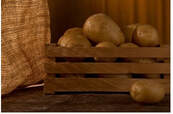 Tips on storing your fresh food to last longer We’ve all had the experience of going to our fruit bowl, pantry or fridge to find wilted, rotten, or mouldy produce which we throw out! This is a waste of good food and money. With the present inflation rate many of us can’t afford this kind of waste so here are some tips on how to make your produce last longer. The fridge and freezer - These are great inventions for improving the longevity of our perishable produce. Your fridge should be between 4-5 degrees Celsius. The temperature will vary between seasons so check the temperature occasionally. Place your fridge or freezer out of direct sunlight and heat so it doesn’t have to work so hard to keep cool and to keep an even temperature throughout the day. Cover all food in the fridge to prevent cross contamination and tainting. In your fridge store veggies in the bottom with meat, poultry and fish on the shelf above and ready to use in the top shelves. Anything that goes in the freezer should be labelled with what it is and the date frozen. Dehydrators are also a good way of preserving excess produce. Tips for fruit and veg Most fruit and veg can be kept in the fridge either in the veggie drawer or an airtight plastic container with a paper towel. The exceptions being potatoes, kumara, onions, garlic and bananas. Excess fruit and veg can be frozen either by first blanching, stewing or snap freezing, then placed in a plastic airtight container or plastic bag. Bananas - Keep your bananas away from other fruit especially if you like them greenish as the gas released by other fruit will ripen the bananas quickly. Once your bananas are ripe, they will release gas which will ripen other fruit. Freeze uneaten bananas without skins on in an airtight plastic bag or container and use for smoothies, baking or fried banana. Avocado – ripen before putting in the fridge, to speed up their ripening put them under your bananas Managing your fruit bowl – Keep only a day’s supply of fruit in your fruit bowl. As cold fruit is not as flavoursome as warm fruit, take a day’s supply out of your fridge at night so it’s at room temperature the next day ready for eating. Keep your fruit bowl out of the sun and in a coolish place.  Potatoes - store with a little soil still on, in a cool, dark, dry place, such as a pantry or cupboard. Use a storage container that is well-ventilated, such as a crate, a cardboard box with holes punched in it, or any container that will allow any excess moisture to evaporate. Onions – keep in a ventilated space, such as on your bench or pantry, in a paper bag or a wire basket.  Onions and potatoes – do not store next to each other. Onions produce a gas that makes potatoes seed quickly. They can be in the same cupboard if separated with good ventilation. Limp veggies such as lettuce, broccoli, celery and asparagus can be revived by placing the stems in a container of cold water. Pre bought packets of lettuce, salad mixes, spinach, coleslaw, open the bag and put a paper towel down each side or place in a brown paper bag. Meat – should be stored in the fridge. If it’s not going to be eaten by the use by date, store it in the freezer in an airtight well sealed plastic bag. In the fridge store meat in butchers paper tightly wrapped, in Styrofoam container it came in or an airtight container or plastic bag. If Styrofoam container is open or punctured use another method of storing. If freezing, remove from Styrofoam and put in airtight plastic bag or plastic wrap. Dairy produce - needs to be stored in the fridge and milk and cream are fine to be frozen. Cheese – once opened, if in plastic wrapping it is best kept in an airtight container with a paper towel or in a tightly wrapped beeswax cloth. For cheeses that come in paper wrappings, rewrap tightly in the paper they came in and put in an airtight container.  Eggs – will last longer if stored in the fridge, however if you want to do any baking they are best kept out of the fridge in a dark place. Bread – store in the freezer and bring out what you need. If you are going to eat the bread in the next three days and it came in a plastic bag, leave the bag open so the bread doesn’t sweat and go mouldy store in a dry, dark, cool place. Keep the crusts on the ends to help stop the middle of the loaf from drying out. These are just some tips on how to store your perishable food, so it lasts longer. Poorly stored and cared for food can be a source of food poisoning, if you need help keeping your food safe to eat Therapy Professionals Dietitians can help. Comments are closed.
|
AuthorShonagh O'Hagan Archives
July 2024
|

 RSS Feed
RSS Feed